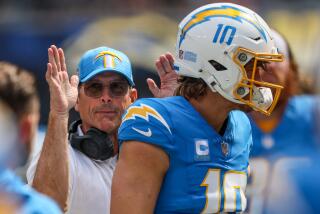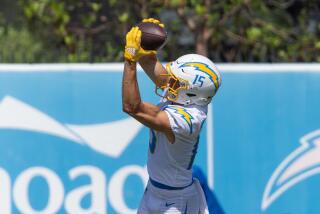DANNY WALTERS : A Recovery That’s Still in Progress
- Share via
LA JOLLA — For 10 months now, Danny Walters has dealt with his Achilles’ tendon and his Achilles’ heel.
The tendon got better.
The heel never will.
Danny Walters, Charger cornerback, is a drug addict. Always will be. He said so the other day.
Last September, he was covering a New York Giant receiver when he heard what sounded like a gunshot. He’s sure that’s what he heard. He fell to the ground, covering his head. A minute later, he looked around and tried to stand up. He couldn’t. What he had actually heard was his leg.
He had ruptured his Achilles’ tendon. Recuperation time: 10 to 12 months. Suddenly, he would have time on his hands, as he did the spring and summer of 1984.
That’s when Walters became a drug addict. He said so the other day.
In the spring and summer of 1984, Walters went on vacation for the first time ever. He had money for the first time ever. He had just made the all-rookie team. He was 23.
“I never left the country, but I went all over the United States,” he says now. “I probably hit 12 out of the 50 states. I went to Maui for a week and spent time in the states of Texas, Arkansas, Illinois, New York, Georgia, Florida, Louisiana, California and Las Vegas, Nev. I was all over. I had (cocaine) everywhere I went. I had no idea where I was. Showed up for mini-camp, though.”
That autumn after every practice, he would go home and use cocaine.
“But always after practice,” he says now. “I never played high, and I never went into the stadium under the influence. But once I left the stadium, I was probably under the influence until the time I got back to the stadium the next day. That went on Monday through Friday. I’d rest Saturday and Sunday. Well, I take that back. I’d rest Saturday, and not do (cocaine) until after the game Sunday night.”
Sooner or later, someone would notice and give him a urinalysis. Soon, someone did. That ’84 season, he went through drug rehabilitation.
That’s when Walters learned he was a drug addict.
He still is, he says.
This past year has been horrible. With the injury and all the time on his hands, he says he has been tempted to do what he did in the spring and summer of 1984, tempted to buy and use cocaine again.
“It’s hard,” he says. “The temptation is always there. And sometimes the people I associated with, they’d forget I have a problem. So I had to disassociate myself from them.
“The stuff (cocaine) is so easy to come by and easy to get. Wherever you go, no matter where you go, it’s there. And for some reason, it follows me wherever I go. It’s just the way it is. I can be having a good time, and--all of a sudden--no matter where I am, I see this chemical substance. And I have to leave because I get these goose bumps and a funny feeling in my stomach.
“And I know if I did (cocaine), that would be it. I would be taking my salary and just throwing it out the window. Because that would happen if I ever did it again. I would be unemployed.”
Former Arkansas Coach Lou Holtz, said this once about Danny Walters: “He’ll either fill up a stadium on Sunday afternoon or sweep it out Sunday night.”
Walters has always seemed to be going either way. He was always the fastest on the field; the fastest out of the weight room. He was always to practice on time; rarely to class on time. He’d charm you; then betray you.
Everyone would ask: What’s he gonna do next? As a freshman at Arkansas, he flunked off the team. As a sophomore, he quit the team, went home to the South Side of Chicago and later rejoined the team. He loved his mom, and he loved his dad, but they didn’t love each other. They were divorced.
Here was a young, unstable human being. And then the Chargers gave him money.
“I had been around drugs all my life as a kid,” he says. “I never really did them. I mean, as a kid, I might have experimented with them, but they weren’t a big issue in my life at the time because I was too busy playing some kind of sport.
“My first experience with cocaine was in school at Arkansas. And then, it was just an experimentation, also. I didn’t really start doing it until I was making money, because you can’t do it when you don’t got no money. So when you’re a kid whose income is zero and now it’s suddenly three digits, that makes a hell of a difference. I was saying, ‘What am I gonna do with all this cash?’ I’d put a little here, a little there and then I’d say, ‘I still got all this stuff left over!’ So you know where it went.
“I used (cocaine) my rookie year (when he tied a Charger club record with seven interceptions),” he says. “But nobody knew because I kept my level of play up to a certain level. I probably could have been a hell of a lot better if I hadn’t been under the influence.
“No, I wasn’t as bad on the stuff as a rookie as I was in my second year. See, that off-season was when it really got bad.”
That was the spring and summer of 1984.
“Nice house, nice car, a lot of pretty ladies in the city,” Walters remembers. “I felt like I’d died and went to heaven. And then when I did die and go to heaven, I became one of the fallen angels. Yep, I was a fallen angel.”
It made news everywhere. Herbert Walters, Danny’s father, read all about it in Chicago. His son was in rehabilitation. Herbert came and saw him.
“Support from home probably got me through the drug rehab,” Walters says. “My father came out to spend a couple days, and that helped a lot. I felt bad because I totally embarrassed my family. And, you know, they told me not to worry about apologizing. They didn’t care about that. They just wanted to know how was my health and my state of mind.”
His state wasn’t good. He decided he was going to retire from football.
“Why quit? Public humiliation,” he said. “But once I got over that, I said, ‘What the hell? I’m allowed one mistake, I think.’ So I said I’d pick up the pieces and move on. And that’s what I’ve been trying to do ever since.”
The Chargers allowed him to return. Walters is grateful, because he says they didn’t have to. He thinks they did it because he was too good to get rid of.
“My potential, my athletic ability,” he says. “It’s always that. They felt like I was a valuable commodity, and . . . I wasn’t a bad person, either. Because if I was a (jerk), there’s no way I would be here now.”
Alex Spanos, Charger owner, is no softie when it comes to drugs. He gives his players one chance to mess up, and that’s it. “And I drug test ‘em,” Spanos says.
He means it. This winter, while wearing a cast from his ankle to his hip, Walters took urinalysis after urinalysis.
Spanos says now of Walters: “We test him whenever we want. He appreciates the fact we helped him, and he’s been clean ever since. . . . Sometimes, we test him once a week or three times a week. He’s never objected.
“Listen, he’s a class kid. He did all he could to rehab himself, and he’s done it. That’s the thing I love about the kid. He has a lot of respect for what we’ve done for him.”
Walters says: “Really, they didn’t have to keep me.”
So in his mind, Walters still could go either way, but he’s moving the right way now. He’ll be working Sunday afternoons; not Sunday nights.
“I still am a drug addict,” he says. “It’s a one-day-at-a-time deal. And it’s the hardest thing to admit when you go into rehab, that you are an addict. Once you can do that, it’s a step in the right direction.”
One day this off-season, when the Achilles’ tendon felt fine but the Achilles’ heel did not, Walters ran over to a local drug clinic and said: “I need some help. I’ve got the urge.”
The goose bumps still come.
He said so the other day.
More to Read
Go beyond the scoreboard
Get the latest on L.A.'s teams in the daily Sports Report newsletter.
You may occasionally receive promotional content from the Los Angeles Times.










